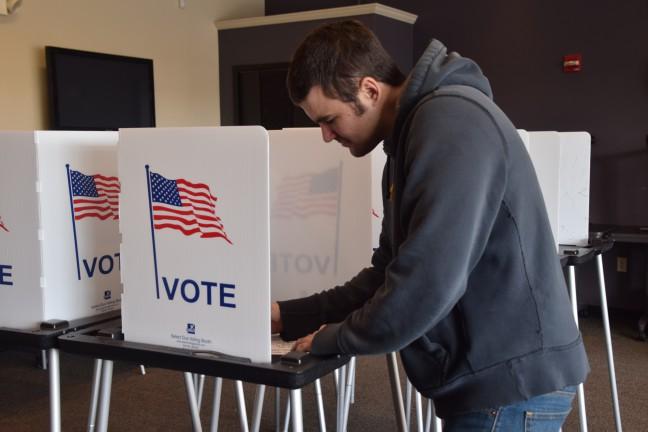Surely by now you’ve received a text message from a member of a political campaign or organization, read an article or scrolled through a social media post from family and friends about the civic duty of voting. Nowadays it seems one cannot go to work, shop on Amazon or Craigslist, perform a Google search or walk down the street without being told that voting is important and being reminded there is an election Nov. 6.
Posters scatter the halls of dorms and academic buildings, using scare-tactics about democracy: “Ignore it, and it will go away.” University of Wisconsin, along with the Morgridge Center, Associated Students of Madison and RecSports hosted VoteFest, which was an initiative to encourage early voting, as well as educate and encourage first-time student voters. All these efforts were part of a greater student voting initiative and competition, the Big Ten Voting Challenge. If you haven’t encountered any of these things, consider yourself lucky.
Even local and national companies are getting in on the action. The Great Dane is offering a free beer if one shows up wearing a sticker. Ian’s Pizza is giving away a free slice of mac ‘n’ cheese pizza. Larger companies are doing it too. Google helps people find where to vote from their homepage. Amazon suggests customers have their Alexa remind them to vote. Facebook is attempting to safeguard our elections by monitoring false news and misinformation.
So why is everyone suddenly concerned about voter turnout and political involvement? Why are classmates, teachers and strangers looking to shame each other into voting? Some may argue that it’s not shaming, but rather a friendly reminder to exercise their right to vote. One might welcome it from a friend, but from the nurse administering a flu shot at UHS, not so much.
Some believe voting is a citizen’s duty because voting is a right. Well no, that’s not quite true either. American citizens have the right to vote, not a duty to vote. Think about it in this way: citizens are guaranteed the right to bear arms. One does not have the duty to exercise this right, no one is forcing them to own or buy a gun.
People argue that if one doesn’t vote, then they have no right to complain about the state of our nation and state. If this were true, then representatives would only be held responsible to those who voted for them, and not those who voted for their opponents. But representatives are to be held accountable to all their constituents, regardless of if they voted, or were ineligible to vote (children, felons, non-citizens), and certainly regardless of who they voted for.
Finally, most believe one should vote regardless of their knowledge of the candidates or the issues at hand. Why is this? Shouldn’t we ask that voters at least rudimentarily inform themselves? Most voters vote straight-party on their ballot, choosing all Republicans or all Democrats. But perhaps, there may be a candidate in a different party that could more ideally represent a voter than their party’s candidate.
If a voter doesn’t do their research they may be misinformed and unknowingly voting for a lesser-than-ideal candidate. Rather than casting an intelligent vote, perhaps it may be rational to trust your fellow citizens, more informed and knowledgeable than you to make the decision. Furthermore, we already do this by electing representatives in the state and federal legislatures. We elect representatives to make the best decisions for all their constituents, rather than allowing the majority rule of direct democracy.
Now, this is not to say that people shouldn’t vote. If one desires to vote, to exercise their right, there is no reason to stop them from voting. But there is no shame in not voting. One should not be rebuked or ridiculed for abstaining — this in itself is a vote, it’s a choice that they have made. And when that choice is not to vote, they still have every ability to protest when our government and our representatives fail their constituents. We have the freedom to vote for the candidate of our choice, but we also have the freedom to vote for no candidate at all.
And encouraging people to vote is not a bad thing either. When encouraging someone to vote, we make voting the important act. But being informed and involved is just as important. This encouragement and the desire for people to stay informed and involved must not die at the end of the day Nov. 6. It should continue, rather than simply rising up every election season when it again becomes cool to be politically active.
Andrew Stein (andrew.stein@wisc.edu) is a senior majoring in political science and economics.


